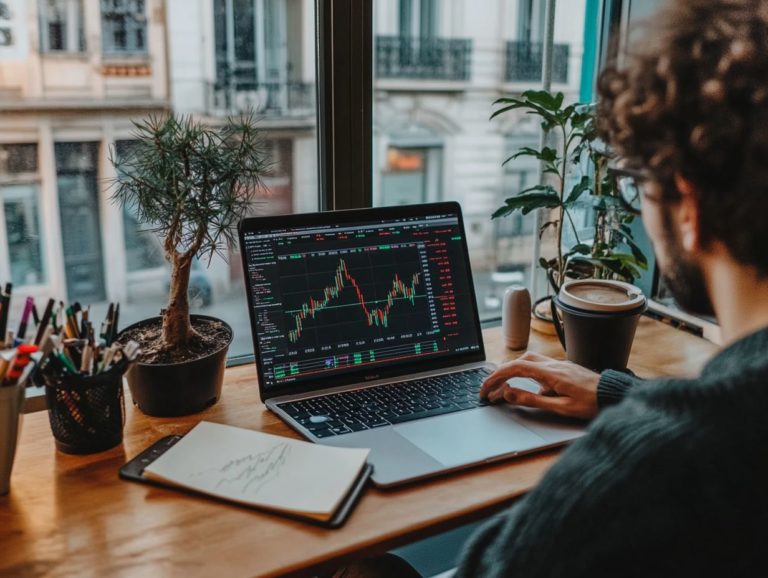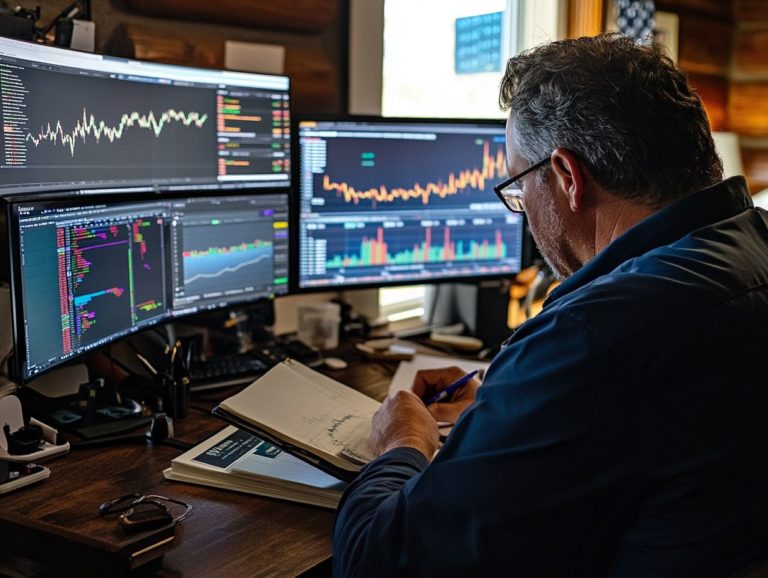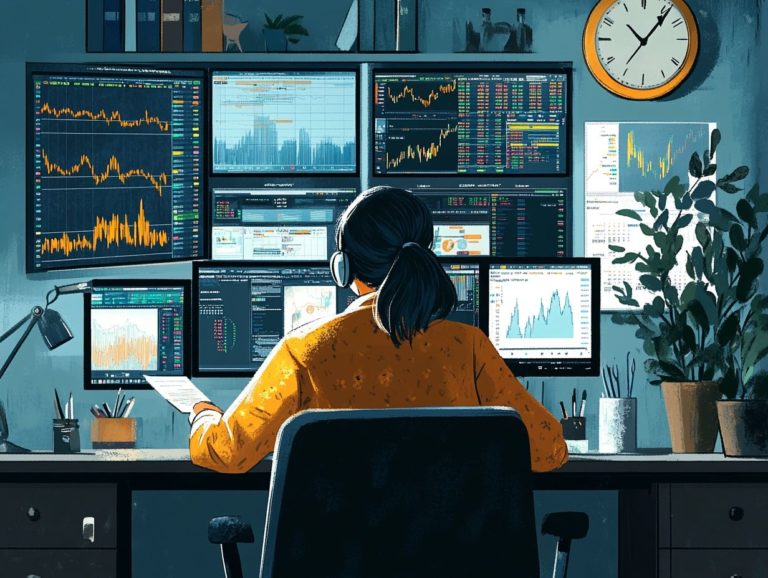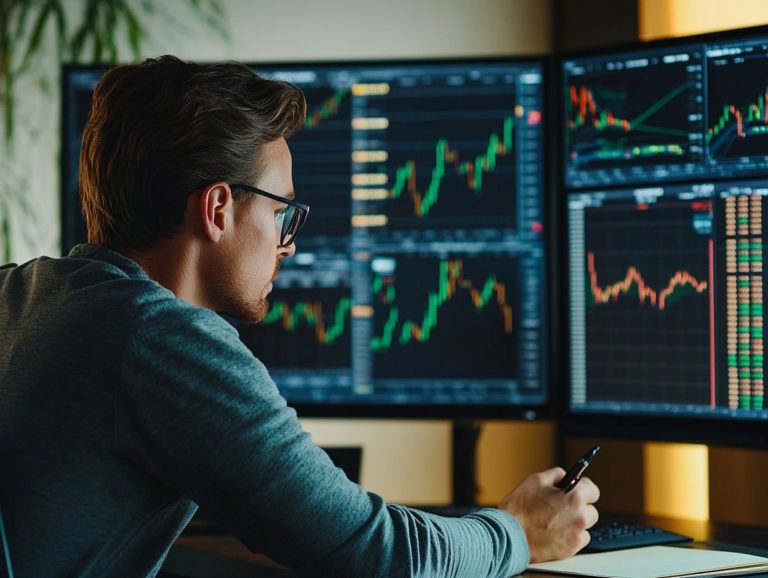5 Emotional Triggers Every Trader Should Know
In the fast-paced world of trading, your emotions can play a significant role in shaping your decision-making process. Recognizing psychological factors is crucial. This awareness helps elevate your trading performance.
You may often find yourself swayed by feelings like fear of missing out (FOMO) or the anxiety of losing money (Fear of Losing Money). These emotional triggers can lead to impulsive actions, resulting in costly mistakes that could have been avoided.
Explore how mastering your emotions can truly transform your trading journey. This article delves into five key emotional triggers, highlighting the common pitfalls they create and presenting effective strategies to help you regain control and boost your trading success.
Contents
- Key Takeaways:
- The Fear of Missing Out (FOMO)
- The Fear of Losing Money (FOLM)
- The Need for Control
- The Need for Instant Gratification
- The Need for Social Validation
- How Do These Emotional Triggers Affect Trading Decisions?
- What Are Some Common Mistakes Traders Make Due to These Triggers?
- How Can Traders Overcome These Emotional Triggers?
- What Are Some Strategies to Manage Emotions While Trading?
- How Can Understanding These Triggers Improve Trading Performance?
- What Are the Long-Term Effects of Ignoring Emotional Triggers in Trading?
- Frequently Asked Questions
Key Takeaways:
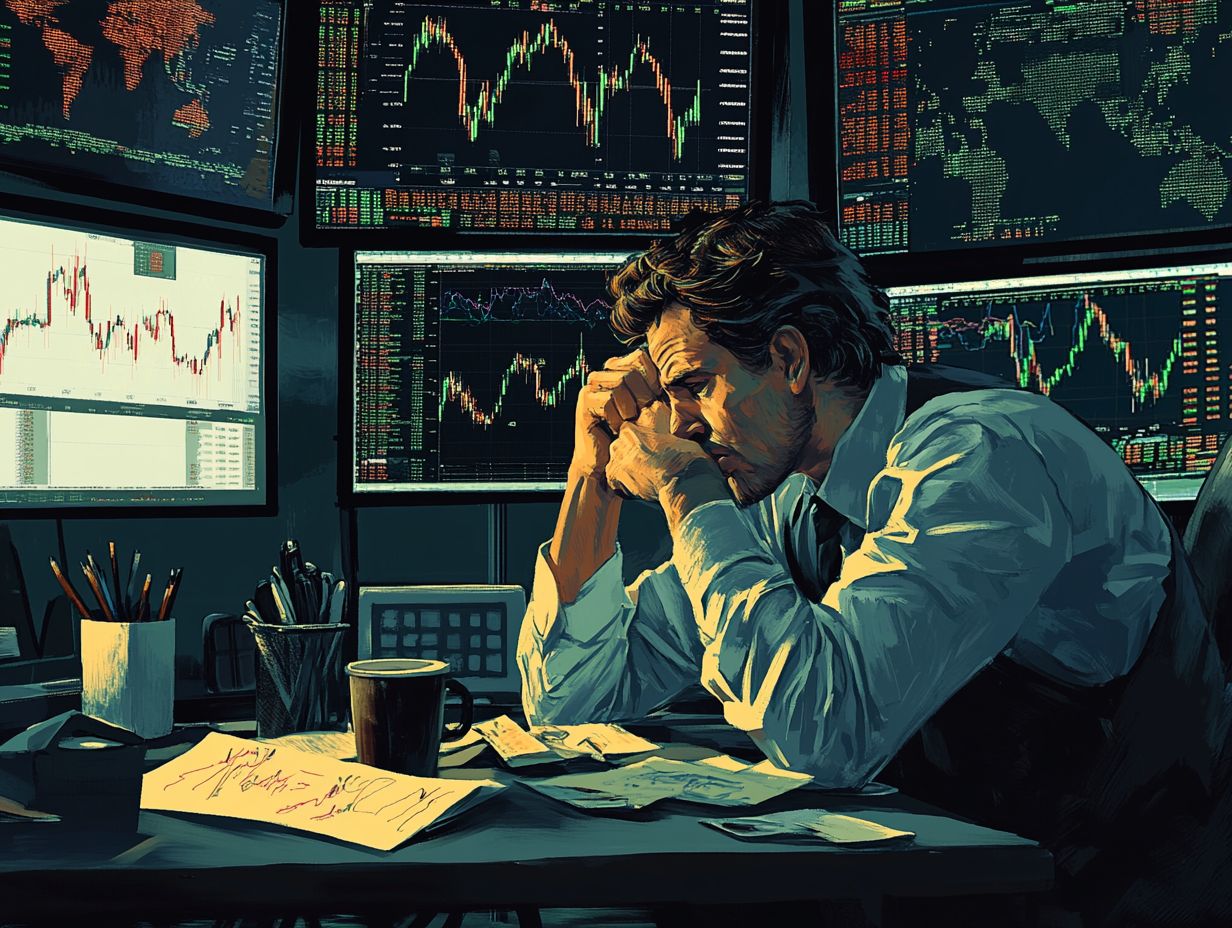
- FOMO can lead to impulsive and irrational trading decisions.
- Fear of Losing Money can cause traders to hold onto losing trades for too long.
- The need for control can lead to overtrading and not following a well-defined trading plan.
The Fear of Missing Out (FOMO)
The Fear of Missing Out (FOMO) is a potent emotional trigger that can profoundly impact your trading decisions. It often compels you to act impulsively, driven by the desire to seize perceived market opportunities. This phenomenon can lead to anxiety and a frantic rush to act, overshadowing rational thought and sound trading strategy.
As you navigate the complexities of market fluctuations, self-awareness is key. Recognizing how FOMO can push you toward risky behaviors is essential, as it often compromises your trading performance and leads to regrettable mistakes.
FOMO is intricately tied to the psychological dance of fear and greed. The fear of missing out on potential profits can cloud your judgment, tempting you to jump on trends without proper due diligence. Think back to moments when you bought a stock purely because it was trending, only to realize later that your decision lacked thorough investigation.
Acknowledging these instances, where your past trades were swayed by emotional impulses rather than strategic planning, is vital.
To combat FOMO effectively, it s essential to integrate a comprehensive trading plan alongside strong risk management techniques. This approach ensures that your decisions are rooted in market fundamentals rather than fleeting emotions, fostering a disciplined methodology that can enhance your long-term success in trading.
The Fear of Losing Money (FOLM)
The Fear of Losing Money (FOLM) is a formidable psychological barrier that can impede your decision-making as a trader, often leading to hesitation or an aversion to necessary risks in the market.
This apprehension may push you toward overly conservative strategies, causing you to forfeit potentially lucrative opportunities simply out of fear. You might find yourself fixating on safeguarding your existing capital instead of exploring growth avenues, ultimately stunting your potential returns.
When emotions dictate your decisions, the chances of missing favorable market conditions increase, amplifying feelings of regret and anxiety. Thus, cultivating emotional awareness and employing effective risk management techniques becomes essential.
By recognizing the impact of FOLM, you can navigate risks with greater efficacy, allowing you to seize significant opportunities while maintaining your mental well-being.
The Need for Control
The innate human need for control significantly influences trading psychology, as traders like you seek to exert influence over your trading environment to mitigate the unpredictability of market fluctuations.
This desire can often trigger heightened emotional responses, such as frustration and anxiety, particularly when market outcomes diverge from your expectations. As you navigate the inherent uncertainties of financial markets, it s not uncommon to feel overwhelmed by fears of loss and the pressure to make swift decisions.
To develop a healthier mindset, it s essential to align your trading plans with realistic risk management practices. By setting achievable goals and implementing disciplined strategies, you can reduce emotional turbulence and cultivate resilience, ultimately discovering a more balanced approach to your trading endeavors.
The Need for Instant Gratification

The need for instant gratification is a strong emotional trigger in trading. It often compels you to chase quick profits rather than aiming for long-term success.
This pursuit can harm your disciplined trading strategies. The impulsive urge may lead to rushed decisions, like jumping in or out of trades without proper analysis.
As a result, you might overlook critical market trends and signals, paving the way for significant financial losses.
Remember, success in trading is a long-haul journey, not a quick dash! It requires patience and a solid plan.
By focusing on thoughtful profit-taking strategies, you can manage emotional reactions and foster sustainable growth in your trading portfolio.
Concentrating on creating a strong trading plan allows you to navigate the unpredictable waters of the market with more stability and confidence.
The Need for Social Validation
The need for social validation can significantly shape your trading behavior. It nudges you to align your decisions with prevailing market sentiments and peer opinions, often at the expense of your own carefully crafted trading plan.
You might find yourself caught up in herd behavior, following the crowd instead of trusting your research or intuition.
This tendency can result in impulsive decisions, leading to costly trading errors.
To counter these risks, cultivate self-awareness and recognize when external influences cloud your judgment. Sticking to your personal trading strategy and making deliberate choices can help you sidestep the pitfalls of fleeting trends.
How Do These Emotional Triggers Affect Trading Decisions?
Emotional triggers like FOMO, FOLM, and the desire for control are significant in shaping your trading decisions. To manage these feelings effectively, consider following 5 tips for tracking your trading emotions, as they can help prevent irrational behaviors that undermine your performance.
You may feel influenced by the fear of missing out, prompting impulsive buys and premature sales.
For example, witnessing a sudden market surge may cause you to rush to invest without proper analysis, leading to losses when the market corrects itself.
Similarly, the fear of losing money can make you cling to underperforming assets, hoping for a turnaround that may never come.
Recognizing how these emotional triggers interact highlights the importance of establishing a strong trading strategy that includes mechanisms for managing your emotions. Understanding the 5 key concepts of trading psychology is crucial for achieving long-term success in the unpredictable trading landscape.
What Are Some Common Mistakes Traders Make Due to These Triggers?
Common mistakes you might make as a trader often stem from emotional impulses. These include impulsive trades driven by FOMO (fear of missing out), hesitations from FOLM (fear of losing money), and straying from your established trading rules. To help combat these issues, consider exploring 5 ways to manage trading anxiety.
These emotional responses arise from anxiety about missing out on potential gains or the fear of making the wrong move.
This can create a damaging cycle of overtrading and holding onto losing positions longer than necessary, clouding your judgment and making it difficult to maintain discipline.
To navigate these challenges, keeping a detailed trading journal is advantageous. This journal serves as a reflective tool to document trades and analyze the emotional influences behind each decision.
Doing so helps you understand how your feelings impact your trading strategies, ultimately enhancing your decision-making over time.
How Can Traders Overcome These Emotional Triggers?
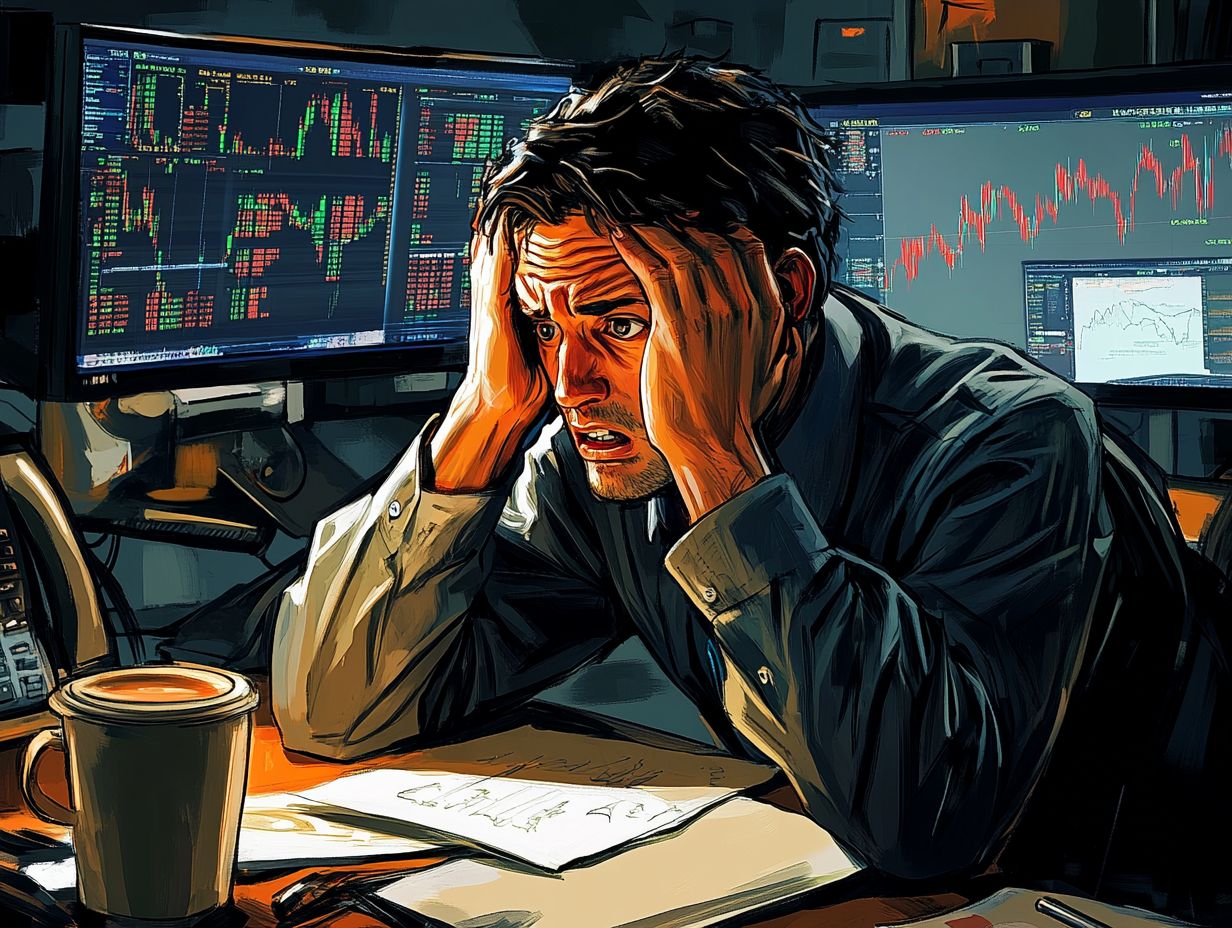
You can effectively overcome emotional triggers by cultivating self-awareness, adhering to a well-structured trading plan, and implementing disciplined risk management strategies. For further insights, check out these must-read articles on trading psychology.
Engaging in mindfulness practices enhances your ability to stay present and focused. This helps mitigate impulsive decisions driven by fear and greed.
Regular self-assessment allows you to identify patterns in your emotional responses, giving you better control over your reactions during high-pressure situations.
Maintaining a detailed trading journal serves as an invaluable tool. It enables you to track your emotional states and the outcomes of your decisions. This overall strategy not only reinforces the importance of sticking to established trading rules but also fosters a more resilient trading mindset, ultimately leading to improved performance.
What Are Some Strategies to Manage Emotions While Trading?
Effective strategies for managing emotions while trading include establishing clear trading rules, employing risk management techniques, and developing a structured trading plan that helps minimize impulsive decisions.
By incorporating elements like position sizing deciding how much money to invest in each trade you can better control your exposure to risk, which ultimately aids in reducing emotional stress.
Setting specific profit-taking goals will guide your decisions, giving you a benchmark to evaluate your performance against your expectations.
Using tools like trading journals allows you to reflect on your emotional responses during trades. This fosters greater self-awareness and discipline. This connection between disciplined trading practices and enhanced overall performance paves the way for more consistent results and a more balanced trading experience.
How Can Understanding These Triggers Improve Trading Performance?
Understanding emotional triggers can significantly enhance your trading performance by giving you the power to recognize and manage the effects of fear, greed, and other emotions on your decision-making. Utilizing psychological techniques to enhance trading can further improve your outcomes.
By cultivating a deeper sense of self-awareness, you can pinpoint your emotional patterns and see how these feelings shape your actions in the markets.
This insight enables you to craft more robust trading strategies, tailored not only to market conditions but also to your personal responses to various scenarios.
When you grasp the emotional currents that drive your decisions, you’ll find yourself better equipped to adhere to your trading plans, thereby boosting your consistency and overall effectiveness.
Such understanding can be the key differentiator that elevates you from a novice trader to a seasoned professional, navigating the complexities of the financial world with confidence.
What Are the Long-Term Effects of Ignoring Emotional Triggers in Trading?
Ignoring emotional triggers can profoundly impact your trading performance, leading to repeated mistakes, dwindling confidence, and a distorted view of market realities. Implementing techniques for emotional regulation in trading can help mitigate these issues.
When you overlook the influence of emotions on your decisions, you may find yourself spiraling downward, grappling with increasing losses that threaten your financial stability.
This emotional neglect fosters a vicious cycle where fear and greed cloud your rational thinking, ultimately distorting your market judgment.
It’s essential to regularly reflect on your past experiences and identify patterns in your emotional responses. By confronting these triggers directly, you not only regain control over your trading strategies but also develop a more resilient mindset. Implementing essential risk management strategies for traders can set the stage for long-term success in the unpredictable realm of trading.
Frequently Asked Questions
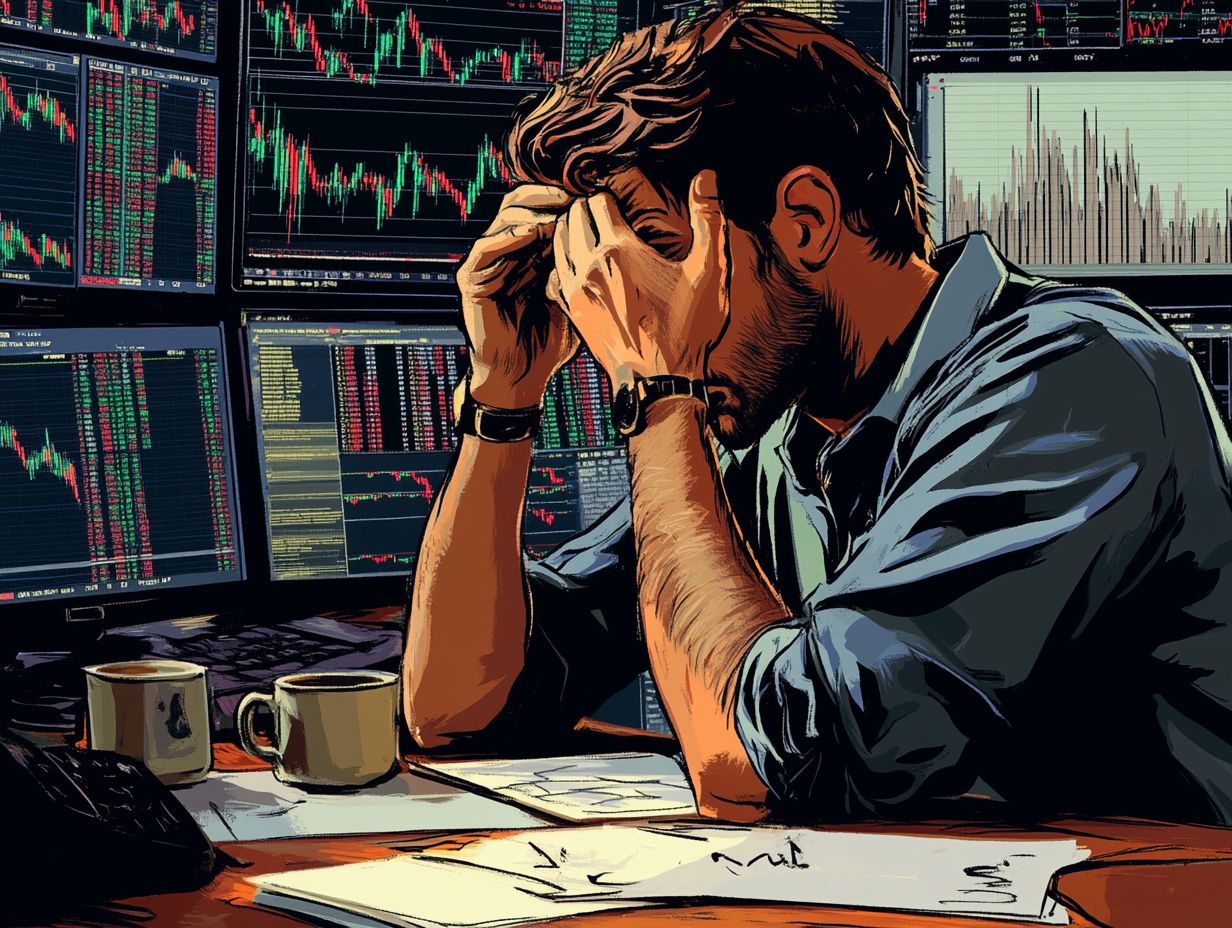
What are the 5 emotional triggers every trader should know?
The 5 emotional triggers every trader should know are fear, greed, hope, regret, and ego. Understanding your trading triggers can strongly influence a trader’s decision-making process and ultimately affect their success in the market.
How does fear impact a trader?
Fear makes traders overly cautious. They might miss out on profitable trades or hold losing positions for too long, leading to serious financial setbacks.
What role does greed play in trading?
Greed pushes traders to take excessive risks for high profits. This reckless behavior can result in major losses and overtrading, where they pursue trades without good opportunities.
Why is it important to understand the emotion of hope in trading?
Hope can keep traders clinging to losing positions, waiting for a turnaround. This can lead to further losses and ignoring warning signs in the market.
How can regret affect a trader’s performance?
Regret makes traders focus on past mistakes, causing hesitation in future trades. It can even lead to revenge trading, where they take unnecessary risks to recover losses.
What impact does ego have on a trader’s decision making?
An inflated ego can lead to overconfidence and poor risk management. Traders may become stubborn, refusing to cut losses or acknowledge mistakes.

